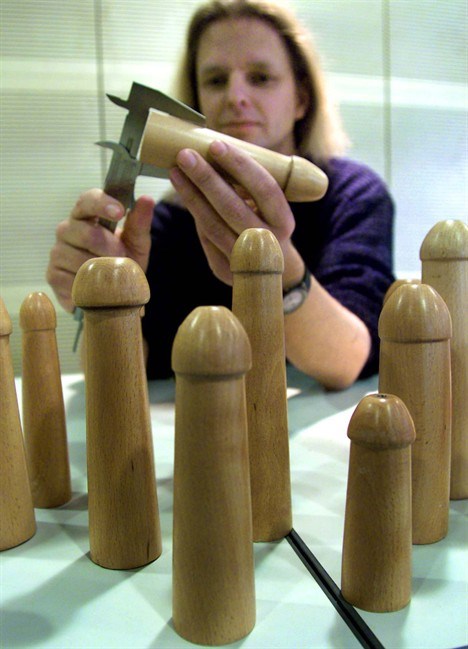Science has spoken and, yes, gentlemen, size does matter.
A newly published study by a University of Ottawa researcher has concluded penis length exerts a measurable sway on females evaluating potential sexual partners.
"We found that flaccid penis size had a significant influence on male attractiveness," concludes the study that was published Monday in the Proceedings of the National Academy of Science.
"Males with a larger penis were rated relatively more attractive."
Biologist Brian Mautz said he came to the study through curiosity over the evolution of male genitalia. Compared to other male primates, human endowment is generous.
"This observation has generated suggestions by evolutionary biologists that the comparatively larger human penis evolved under premating sexual selection," says his paper. "Novels, magazines and popular articles often allude to the existence of a relationship between penis size and sexual attractiveness or masculinity."
Nor is the effect limited to pop culture.
"Another project I was on, looking at female preferences in genital size in fish, showed that females actually do discriminate in males before copulation even begins," Mautz said. "That potentially influences genital evolution."
Previous studies have attempted to discern what women like by, for example, asking them to choose between a series of drawings of men that vary only in the size of the anatomy in question. Mautz believes those conclusions are probably limited by self-censorship.
"When you directly ask someone about a sensitive topic, you're likely to get some bias in responses," he said. "Penis size isn't supposed to matter."
His study tried to mask its intent by introducing three variations on male appearance: body shape (shoulder-to-hip ratio), height and penis size. Those variables were presented in seven gradients, small to large, and intermixed until there were 343 combinations.
Each variation was represented in a computer-generated, life-sized picture of a naked male, which could be rotated to allow an examination of the image in profile. A study group of 105 heterosexual women were then asked which picture they found most sexually attractive.
Perhaps unsurprisingly, they preferred men who were tall, long and V-shaped. Overall, body shape accounted for about 80 per cent of the variation in attractiveness scores, penis size about six per cent and height about five per cent.
"The finding suggests that selection on penis size is potentially as strong as selection on stature."
That finding was reinforced by slower response times for some pictures.
"We found a significantly positive, albeit small, correlation between penis size and response time," the study says. "This finding is consistent with a pattern in adults whereby attractive stimuli are viewed for longer periods."
That attraction, however, wasn't a simple formula of bigger is better.
"Attractiveness increases rapidly until you reach around average for each of the three traits," said Mautz. "Then, although the attractiveness continues to increase, it doesn't increase as much."
What was truly interesting was the interaction between the three traits, Mautz said.
"If you look at how penis size interacts with male height, it has a differential effect at the lower height sizes. Take the tall men — you get a really big impact (in attractiveness) of how large your penis is relative to your height.
"An increase in penis size if you're of average height does influence your attractiveness. It doesn't do quite as much as it does at the upper end of the height spectrum.
"If you're short, it doesn't matter what size your penis is."
Statistically, 185-cm tall men get about twice the boost in attractiveness that their 165-cm friends do as length increases from six to 10 cm.
If that doesn't seem fair, Mautz hastens to point out his study only considered three male traits.
Characteristics such as musculature — not to mention a pleasant smile or great hair — were not considered.
Still, he said, his results do suggest that male gentalia factor into sexual selection and are therefore subject to evolutionary pressure.
"It shows that females can exert a choice and influence genital evolution, which is a relatively understudied area."
His conclusions also have considerable intrinsic interest.
"You're my first interview," Mautz told The Canadian Press. "I'm watching emails roll into my account as we speak."



